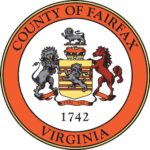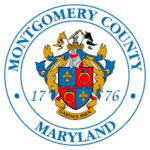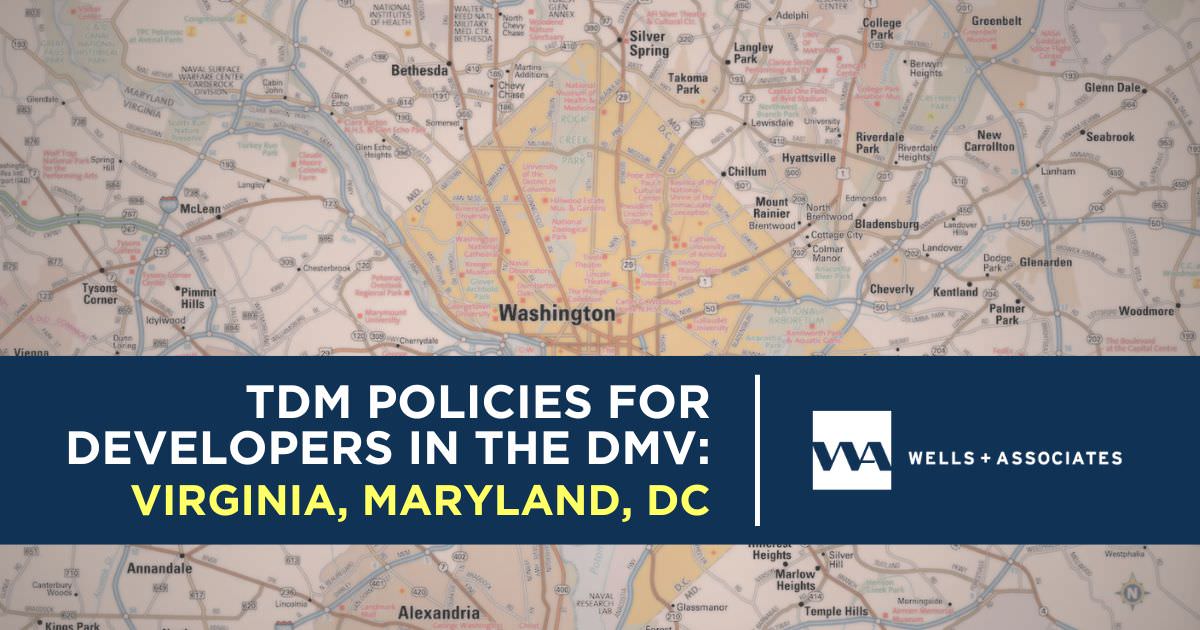Transportation demand management (TDM) policies are enacted by local jurisdictions to incentivize non-vehicular modes of transportation in order to reduce traffic and create a more sustainable transportation system.
While TDM policies are enacted to produce a public good for particular communities, they are also “good for business” – encouraging developers to build or revamp properties that reduce roadway traffic, give tenants and commuters more mobility options, and reduce development costs, such as parking spaces for single-occupancy vehicles.
While the goals and benefits are similar across jurisdictions, each jurisdiction’s TDM policies and programs differ. In this article, we present an overview of the TDM policies for jurisdictions in the Washington, DC metropolitan area: in Virginia (Fairfax County, Arlington County, City of Alexandria), in Maryland (Montgomery County), and in the District of Columbia.
For further details about these policies and or to find out about TDM requirements in your area, reach out to our TDM team.
Fairfax County TDM Policy Overview
 Fairfax County, VA reviews each site individually to determine if TDM requirements are necessary. If so, Fairfax County will require a TDM Plan or Work Plan and require the developer to implement and monitor a TDM Program in accordance with Fairfax County’s TDM guidelines (updates are expected in 2025). It should be noted that the County’s trip reduction goals vary and are divided into “Tysons” and “non-Tysons” geographic areas.
Fairfax County, VA reviews each site individually to determine if TDM requirements are necessary. If so, Fairfax County will require a TDM Plan or Work Plan and require the developer to implement and monitor a TDM Program in accordance with Fairfax County’s TDM guidelines (updates are expected in 2025). It should be noted that the County’s trip reduction goals vary and are divided into “Tysons” and “non-Tysons” geographic areas.
Financial Considerations for Developers:
Fairfax County typically requires certain funds to be held by developers, commonly the TDM Account, TDM Incentive Fund, and TDM Remedy Fund. Rates are dictated in proffers and TDM Work Plan.
Learn more:
W+A Services for Developments in Fairfax County
Research: Forecasting Trips and Managing Density Over the Long Term in Fairfax County, VA
Arlington County TDM Policy Overview
 Most developments of any size in Arlington County, VA are required to develop a Transportation Management Plan (TMP) and implement a TDM Program in accordance with their site plan requirements, based on the standard site plan requirements (Item 40.A-E). Unlike Fairfax County, Arlington County handles performance monitoring and charges the developer accordingly. However, similar to Fairfax County, developments in Arlington must still designate an individual to oversee the program and coordinate with the County (the Property Transportation Coordinator) and deliver annual reports detailing compliance efforts.
Most developments of any size in Arlington County, VA are required to develop a Transportation Management Plan (TMP) and implement a TDM Program in accordance with their site plan requirements, based on the standard site plan requirements (Item 40.A-E). Unlike Fairfax County, Arlington County handles performance monitoring and charges the developer accordingly. However, similar to Fairfax County, developments in Arlington must still designate an individual to oversee the program and coordinate with the County (the Property Transportation Coordinator) and deliver annual reports detailing compliance efforts.
Financial Considerations for Developers:
While Arlington generally requires no specific funds, the developer pays the County to monitor the TMP’s performance and the site is typically required to provide an incentive program on an ongoing basis for building users at a rate set by the County.
Learn more:
TDM Plans for Arlington County Developments
W+A Services for Developments in Arlington County
Case Study: Key Bridge Marriott Redevelopment
City of Alexandria TDM Policy Overview
 Commercial developments with more than 9,999 sf of commercial space and residential buildings with 20+ units or hotels with 30+ rooms must either pay a fee to the City of Alexandria, VA annually or invest in developing and managing their own TDM Program or TMP to benefit building users. Rates are set by the City annually and various rate credits are available in accordance with their TMP Policy.
Commercial developments with more than 9,999 sf of commercial space and residential buildings with 20+ units or hotels with 30+ rooms must either pay a fee to the City of Alexandria, VA annually or invest in developing and managing their own TDM Program or TMP to benefit building users. Rates are set by the City annually and various rate credits are available in accordance with their TMP Policy.
Financial Considerations for Developers:
The annual TMP Fund for the property is based on size. Base rates in FY2025 are $0.34 per sf of office space, $0.27 per sf of retail space, $0.16 per sf of industrial space, $109.01 per residential unit, and $54.39 per hotel room.
Learn more:
TMPs for the City of Alexandria
Ways to Leverage the TMP Fund in the City of Alexandria
W+A Services for Developments in Alexandria
Case Study: West Alex TMP Program Management in the City of Alexandria
Montgomery County TDM Policy Overview
 A TDM Plan is required to be developed and implemented at certain developments in Montgomery County, MD based on location and size. There are 3 tiers of TDM Plans: a TDM Basic Plan (Level 1), TDM Action Plan (Level 2), and TDM Results Plan (Level 3). The level is determined based on the location and size of development as outlined under Section 42A-26 of Montgomery County’s Code.
A TDM Plan is required to be developed and implemented at certain developments in Montgomery County, MD based on location and size. There are 3 tiers of TDM Plans: a TDM Basic Plan (Level 1), TDM Action Plan (Level 2), and TDM Results Plan (Level 3). The level is determined based on the location and size of development as outlined under Section 42A-26 of Montgomery County’s Code.
Financial Considerations for Developers:
Level 2 and 3 TDM Plans must show funding to support the TDM Program and increased funding is required if goals are not met. Additionally, the TDM Plans require monitoring to be done by the developer or an approved consultant.
Learn more:
Case Study: Marriott HQ Relocation – TDM, Parking, and More
Washington, DC TDM Policy Overview
 A TDM Plan is required for projects in the District of Columbia with more 10,000+ gsf of commercial/office/retail space or more than 20 residential or hotel units. There are 3 tiers of TDM plans a property may be required to implement: Baseline, Enhanced, or Enhanced+. The tier is based on traffic impacts and parking supply. Full descriptions of each tier’s requirements can be found in Appendix C of the CTR Guidance.
A TDM Plan is required for projects in the District of Columbia with more 10,000+ gsf of commercial/office/retail space or more than 20 residential or hotel units. There are 3 tiers of TDM plans a property may be required to implement: Baseline, Enhanced, or Enhanced+. The tier is based on traffic impacts and parking supply. Full descriptions of each tier’s requirements can be found in Appendix C of the CTR Guidance.
Financial Considerations for Developers:
The Baseline TDM Program includes ongoing incentive costs and some infrastructure costs for EVs, an Enhanced TDM Program requires additional incentives to be purchased as well as additional infrastructure and amenities to be provided which have cost impacts, an Enhanced+ TDM Program requires contribution to a city-held fund, further incentives and amenities, and monitoring which would require an outside consultant.
Learn more:
W+A Services for Developments in DC
Case Study: Georgetown University Law Center
Case Study: Lafayette Center Micromobility
Contact our TDM Team
Courtney J. Menjivar
Vice President | (703) 676-3636
cjmenjivar@wellsandassociates.com
Courtney Menjivar is a passionate global implementer of Transportation Demand Management (TDM) programs. TDM programs aim to reduce reliance on single-occupancy vehicles, giving more transportation choices to commuters and raising the value of real estate developments.
Marie Cox, TDM-CP
Principal | (703) 676-3629
An accomplished sustainable mobility consultant, Marie Cox works closely with commercial and residential real estate properties and developments to leverage transportation programs and amenities to enhance sustainability, gain a competitive advantage, and attract tenants.



